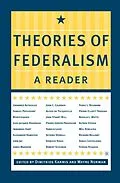This project pulls together classic and modern readings and essays that explore theories of federalism. Spanning the Seventeenth through Twenty-first-centuries of European, U.S. and Canadian thinkers, this attempts to be a comprehensive reader for students in political theory. The emphasis throughout is on the normative argument, the advantages or disadvantages of federal and confederal arrangements compared to unitary states, and on the relative merits of various proposals to improve particular federations or confederations. These also draw on the full range of political science subfields: from political sociology, political economy and constitutional studies to comparative politics and international relations. There are also readings, both contemporary and historical, that attempt to clarify conceptual issues.
Autorentext
DIMITRIOS KARMIS is Assistant Professor of Political Science at the Universite Laval, Quebec City, Canada.
WAYNE NORMAN holds a Chair in the Centre for Applied Ethics at the University of British Columbia, Vancouver, Canada.
Inhalt
The Birth of Federal Theory: an Alternative Political Language in the Early Era of Centralized States The Enlightenment Debate Over the Normative Potential of International Federalism The American 'Invention' and Nineteenth-century Debates Over Rival Types of Federalism The mid-Twentieth-Century Debate: Federalism Between Obsolescence and Panacea The Contemporary Debates: Federal Citizenship in Culturally Diverse Democracies
